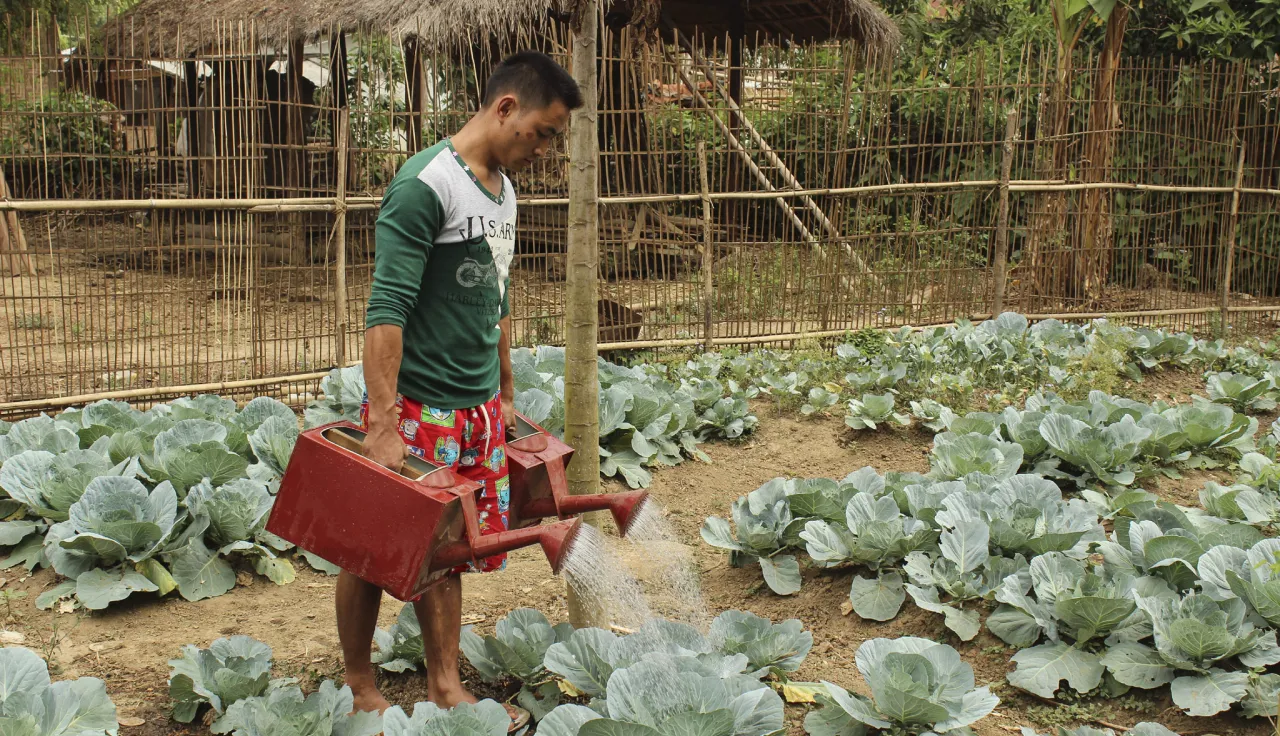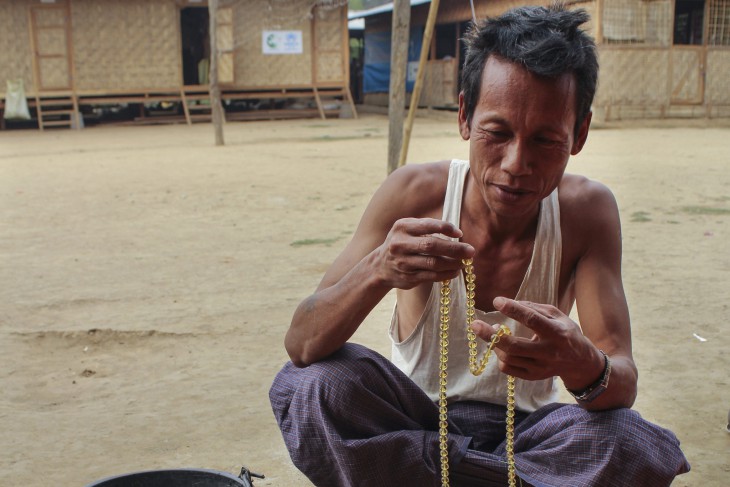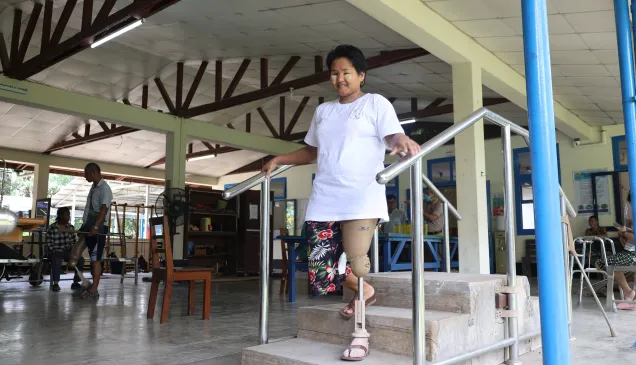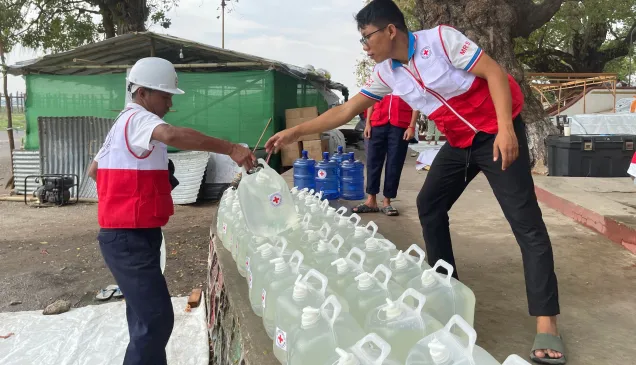Myanmar: Displaced people in Kachin state learn to cope

In a shady garden on the outskirts Myitkyina, the capital of Kachin state, a young couple are hard at work weeding and watering their vegetable plot. Nothing unusual about that, except that this young couple have only recently started their garden, and this is not their real home.
Dawng Nwa (22) and her husband Brang Nang (23) are among approximately 80,000 people who were forced to flee their home villages when clashes broke out between the Kachin Independence Army and the Myanmar army in 2011. Many of the displaced are still living in camps scattered across Kachin. Now staying with her parents, Dawng Nwa remembers vividly the day they had to flee: “It was terrible. I had never experienced anything like it, we could hear the sound of guns. We were all so afraid.”
Not only did the couple have to abandon their home, they also left behind their land and livelihood. With no money and no means of earning any, they did not like relying on hand-outs from family or from charities – a common problem among the displaced in Kachin.

With the help of the Myanmar Red Cross Society (MRCS) and ICRC, Dawng Nwa and Brang Nang are growing vegetables to supplement their income and feed their family. © ICRC/J. Powell
To help people like Dawng Nwa and Brang Nang, the Myanmar Red Cross Society (MRCS) has joined forces with the ICRC to try to find ways for displaced people to supplement their income. One way is through growing vegetables, which provides food for the family while any surplus crops are sold on the local market. The ICRC has donated seeds, tools and fertilizers, and trained local MRCS volunteers to work with the families, teaching them how to plant and tend the vegetable plots, and sorting out any problems that may arise. Finding the land to plant is not always easy. Dawng Nwa’s father was persuaded to let the couple plant and tend a patch of his own land.
For the young couple, growing the vegetables has proved to be a big success. They have already harvested tomatoes and carrots. They still have a crop of healthy cabbages to harvest and plan to plant more when the rainy season starts. MRCS volunteer Yein Nan enjoys her regular visits to the couple and sees the benefit their garden brings, explaining: “They earn money by selling small amounts of produce, the income contributing to the family purse.”
Learning new skills
Helping displaced people gain a little financial independence is a new initiative. MRCS volunteers work with displaced communities to identify the right activities to develop. A few kilometres outside Myitkyina, in Khar Nan Camp which is home to 26 displaced families, a different solution is being tried. The inmates themselves decided that they could earn income and learn new skills by taking up amber polishing. This semi-precious stone – millions of years old and mined in northern Myanmar – comes in a whole range of colours, from translucent light gold to a deep glowing red. The raw amber has to be graded, cut and polished before being made into jewellery which is highly prized, both in Myanmar and abroad.
Maung Htun, displaced from his home along with his wife and six children, came to Khar Nan camp in 2011. He explained: "When we first got here there was no camp, only two families living in a small hut. We didn’t have rice, cooking oil or salt and we had to eat what people could give us."
Recalling the traumatic events that drove him and his family from their home, he said: "The fighting was close by and many mortar bombs fell into the village, killing and injuring people, so we could not live there any longer."

Maung Htun, displaced from his home along with his wife and six children, came to Khar Nan camp in 2011. Maung Htun is already skilled in amber polishing and has started to teach others living in the camp. © ICRC/J. Powell
Maung Htun is already skilled in amber polishing and has started to teach others living in the camp. The MRCS and ICRC are supporting the project and plan to supply grinders and safety materials so that more of the displaced community can take part.
The raw amber is expensive which means that families can only afford to buy small quantities at a time. They sell the polished amber beads to a wholesaler, who in turn sells on to local and international markets. Maung Htun explained ruefully that the profit they make depends on the price they pay for the raw materials and how well they can bargain with the wholesaler. A single bead can take 15 minutes to make, so the whole group work together to make a long string, sharing the profits.
A sustainable approach
Plans are under way to teach other skills such as tailoring and motorbike repair. Learning these new trades has lots of advantages. For Claudia Matter, who heads the ICRC’s programmes in Kachin, the project is more than a simple income-generation initiative: ”I believe these projects are equipping people with skills they can take back home with them. It’s a sustainable approach that they can continue to use in the future.”
Living in the camps around Myitkyina is a stopgap solution, for there is no certainty whether the people will be able to return home. Those in the camps long to go home, but until there is a guarantee of security, and the land around their villages is clear of mines and other weapon contamination, returning is not an option. Maung Htun is resigned to making the best of things: "My hope is to go home, but it's not possible, so for now I have to do the amber polishing and try to rebuild my life here."



